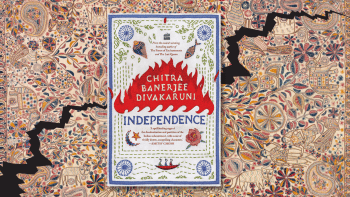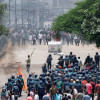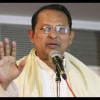The minority report in India

There was never a good time to be a Muslim in postcolonial India, the young historian Pratinav Anil says in his superb, richly packed book Another India: The Making of the World's Largest Minority, 1947-1977. "—Not unless one was the right kind of Muslim," he suffixes. Anil's skillful research bares this reality, often obscured by the Saffron's now ubiquitous might in South Asian politics. One would be forgiven to think the plight of Muslims magically anted up to tenfold under Modi. In truth, the defenestration of the Muslim community in India has been an integral part of partitioned India, aided and sometimes created by the Congress' long rule after Independence.
In Another India, Pratinav Anil unambiguously faults Nehruvian secularism—the very mantle championed by historians such as Mushirul Hasan for whom "the congress best represented the Muslim interests from the fifties on." That this brand of "Indian" secularism definitely paved the ground for the BJP's present dominance is hardly breaking news, but it wasn't as if the Muslims fared any better under those ideals. Nehruvian secularism was aimed chiefly "at Hindu reform—the majority community being the only subject worthy of secularization—leaving Muslims to be cosseted by its self-appointed custodians."
Another India is a portrait of the many facets of Muslim politics taking place in India through its first 30 years, from the Nationalist Muslims in the likes of Maulana Azad and Humayun Kabir (who capitulated much to the Congress for meagre promises of cultural and jurisprudential autonomy) to the All India Muslim League, borne out of the vestiges of the league that stayed back in India and had found purpose in South India, to the Quam and the various rival sects, which competed for the sympathy of the Indian Muslim. Indeed, Anil's most vivid writing is seen in the second-half of Another India where his research on the changing priorities and character of the Jamaat-e-Islami Hind, delineated through their mouthpiece Radiance, provides an illuminating perspective on Muslim agency in an environment of Congress hegemony.
The routine humiliation of a minority seen as a "threat", perennially treated as a sympathiser, or worse, a spy of the enemy neighbour makes for a depressing read. Still, Pratinav Anil writes compellingly on the nature of riots, particularly the Indian character of it, where Muslims tend to be disproportionate victims. Riot are not, as Anil says, "Spontaneous moments of savage frenzy. Rather they are put together, almost with the precision of a watchmaker, by cynical actors all too aware of the political capital to be made from confessional polarization."
Such is the case of the Indian Muslim. Another India ends, appropriately, by bringing class to the fore. The "right kind" of Muslims, the minority among the minority who fared extremely well, were the wealthy elites. The princes and ashrafs—such as Ifthikar Ali Khan, the Nawab of Malerkotla—who were far more interested in securing their pensions and titles than fighting for a better fate for their fellow Muslims. The Nawabs and their descendents continued to be paid handsomely even a decade after independence. We see Nehru assure an "educational allowance" for the King of Oudh and his family. "Here, then, was a class solidarity of a different stamp", says Pratinav Anil, "borne by the Harrow and Cambridge educated premier's fascination with the derelict glamour of the Indian aristocracy."
Another India is essentially a grim portrait. The representation of the Indian Muslim is significantly and categorically lower than it should be. And that has been the case since Independent India. "If the eminent Nehruvians had little standing, the eminent Modians—Najma Heptulla, Mukhtar Abbas Naqvi, M.J. Akbar—have even less", says Anil.
In today's India, and perhaps South Asia in general, history survives perilously, surrounded by the malignancies of populism and philistinism. Records such as Pratinav Anil's Another India however promise a strong effort at fending off the jingoistic clamour bristling out of that political sphere.
Shahriar Shaams has written for Dhaka Tribune, The Business Standard, and The Daily Star. He is nonfiction editor at Clinch, a martial-arts themed literary journal. Find him on twitter @shahriarshaams.

 For all latest news, follow The Daily Star's Google News channel.
For all latest news, follow The Daily Star's Google News channel. 











Comments